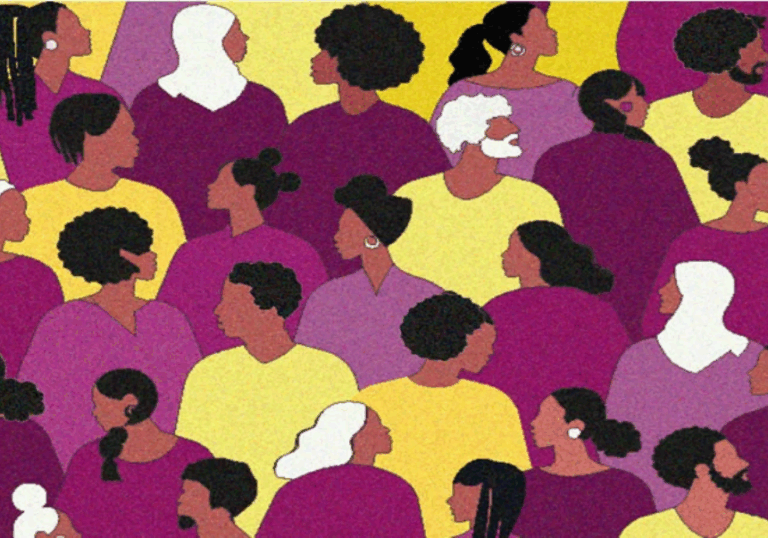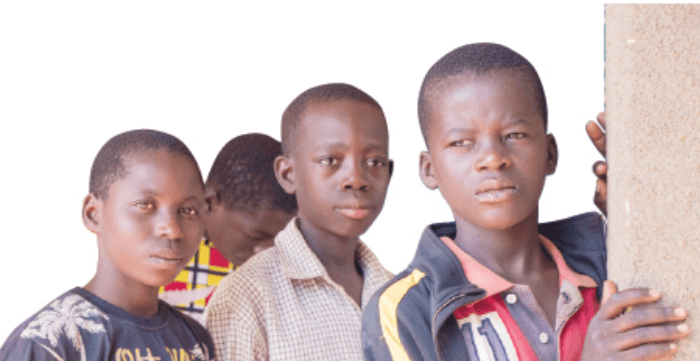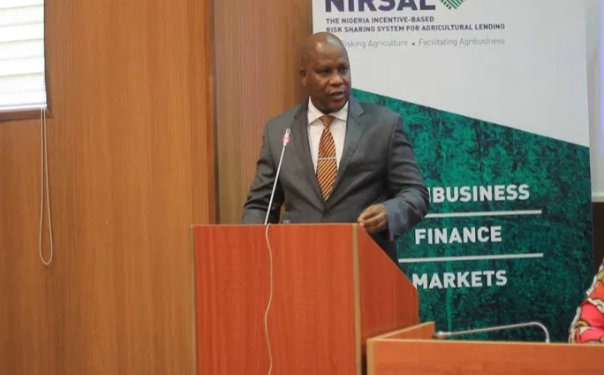All of these children have something in common. They work from morning till night to support themselves and their families
Ejike dreams of becoming a governor. He arrived in Lagos in January 2020, leaving his parents in Ebonyi state. His brother promised to send him to school. But he’s in Lagos, selling CDs in traffic- just like his brother. Making between N6,000-N10,000 a day, Ejike supports his brother’s family of four. Ejike wants to become a governor in Lagos state. He says his brother promised to send him to school next year. He’s told he can’t go to school this year because of COVID 19. Ejike is 14 years old.
Farouk is 17 years old. His mum sells herbs in Ibadan while his dad is an Alfa (Islamic scholar). He travelled to Lagos on his own and caters to himself, calling passengers at the motor park and sometimes bearing load for money in the market in Oshodi. During the COVID19 lockdown, Farouk says he barely survived. He couldn’t make money as markets were open only temporarily and buses were not moving. He said one of the few women who came to the market fed him throughout the lockdown.
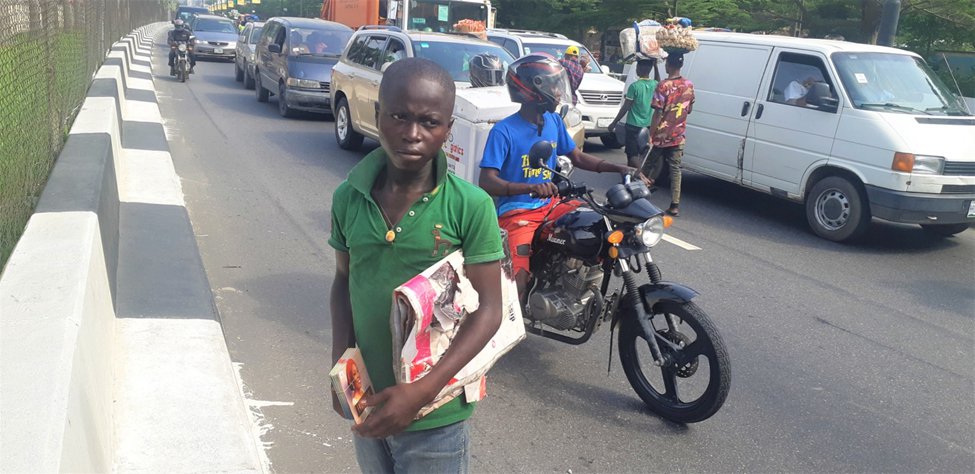
Ejike selling CDs in traffic along Osborne road, Lagos
Ajoke, 12 and Amirat,14 have been hawking at Oshodi for years, helping their mothers find food for their younger ones. Coming from a family of six, Amirat says her father doesn’t do any work. She spends over 12 hours trying to sell sausage rolls to passengers at the garage. The money she makes helps feed her siblings. Ajoke stays with her guardian. Her parents are in Ogun state. She sells sweets and chewing gum to support a family of seven.
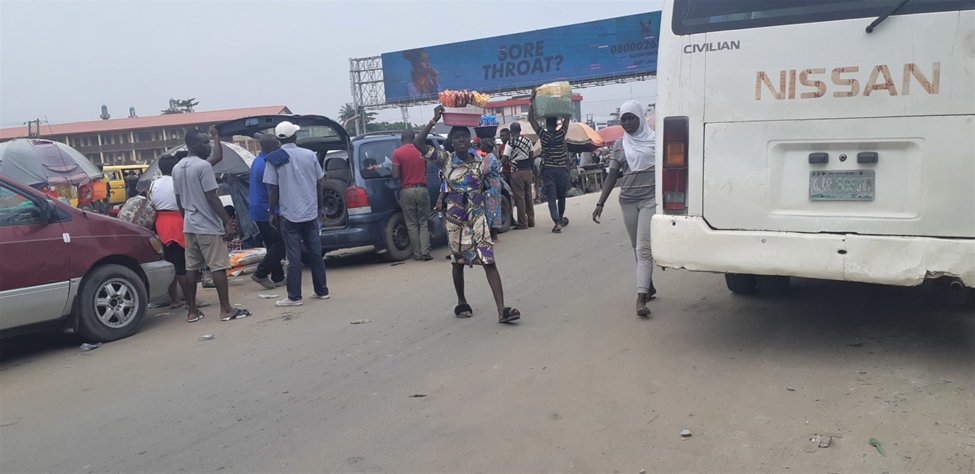
Ajoke and Amirat hawking at Oshodi, Lagos
Ogun state has one of the largest concentrations of industries in Nigeria. Driving through Ota, one notices a lineup of factories. Ifo is more of an agrarian town, housing farmlands and farms for animal husbandry. Both towns have children working as breadwinners.
Isaac is 14 years old. He hawks ice cream in Ota, pushing his cart around the town from 8am till 7pm every day. Hailing from Ebonyi state, he was brought to Lagos in January 2020 by a family member, so that he could raise some money to complete his education in 2021. With COVID19 lockdown taking about 6 months off the year, his plans have fallen through. He says he still manages to send between N2,000 and N5,000 to his parents back home.
Chioma lives in Sagamu. At 16, she supports herself by working in factories. She lost her job during the lockdown. I met her in Ota trying to get another one. Although the companies pay between N10,000 and N15,000 monthly and she works from 7am till 7pm, she told me she had no other choice, since she didn’t want to work as a commercial sex worker. None of her parents fend for her.
Taiwo works in a poultry farm at a farm settlement in Ifo. At 16, he helps his father meet up with his daily work quota so he can get a full day’s wage. He cannot go to school because the whole family rely on the income he, and his father, bring home every month.
All of these children have something in common. They work from morning till night to support themselves and their families with no respite in sight. COVID 19 has also made things tougher for them.
THE ILLEGALITY OF CHILD LABOUR
According to data from the National Bureau of Statistics as at 2018, 47% percent of the Nigerian population is under 15 years old. Also, “about 50% of children are involved in child labour, while 39% are working under hazardous condition”.
The reason for this is not far-fetched. Same data from the NBS shows that 18.5% of Nigerian women are married before they are 15 years old and 47% before age 18. This means that they would possibly have a lot of children they might not be able to cater for. According to the 2020 Poverty and Inequality report released by the NBS, 40% of Nigerians live below the poverty line.
In 2013, Nigeria approved a National Policy on Labour and a National Action Plan. In 2014, Ogun state developed an Action Plan for the Elimination of Child Labour in Nigeria (2014-2017). The plan identifies poverty and inadequate population control as some of the gaps in addressing child labour in the state.
Mr Olukunle Sanni is the founder, Childhood Advancement and Empowerment Initiative. According to him, in Ogun state, some parents send their children to the towns to work; and come to collect money from them every weekend. During the COVID 19 lockdown, Mr Sanni said his NGO noticed an increase in children working as street traders, farmhands and house helps; to support their families. Unfortunately, partners of the NGO were also affected by the pandemic and were unable to give so much in support of child labourers.
The SDG 8.7 aims to end “all forms of child labour by 2025”. Mr Sanni believes this is possible if the Ogun State Steering Committee on Child Labour collaborates with the private sector. According to him, NGOs in the state are willing to partner with the government in areas that they have identified as hotspots.
Agatha Kolawole, Child Labour National Officer of the International Labour Organization identifies poor implementation of social frameworks, unemployment and poverty, conflicts and emergency situations, parental negligence, and low enforcement of child rights laws as causes of child labour in Nigeria. Referring to Convention 182 of the ILO on Worst forms of Child Labour, she advised the government to strengthen social protection frameworks including affordable housing, employment opportunities; and provide accessible quality education.
Mrs Kolawole describes Nigeria as a pathfinder country with the establishment of the Alliance 8.7 network. She believes that Nigeria can drastically reduce child labour with strengthened collaboration between the government and Civil Society Organizations to achieve the Sustainable Development Goal 8.7.
Barrister Taiwo Akinlami, a child rights advocate says in functional societies, the responsibility of raising a child should not be solely placed on the family. According to him, “children are citizens of Nigeria, not grand- citizens.” They should therefore have their full rights as citizens protected.
Quoting the International Labour Organization, Akinlami also highlights that one of solutions to child labour is addressing poverty through the provision of social protection i.e. provision of basic amenities for parents, especially indigent ones. “When the existence of a people is abused, they will abuse their children”, he says.
In 2003, Nigeria domesticated the United Nations’ Conventions on the Rights of a Child by adopting the Child Rights Act. However, not all states have adopted the Child Rights Act. According to UNICEF, 21 out of 36 states have domesticated the CRA. Lagos and Ogun states are some of the states where child rights have been preserved by law.
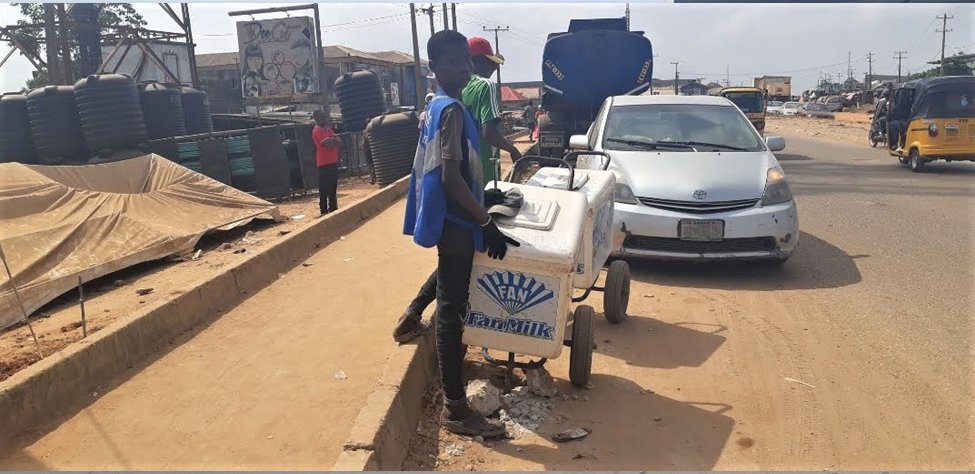
Isaac, selling yogurt in Ota, Ogun state
I spoke to the commandant, NAPTIP Lagos Command, Mr Ganiu Aganran on child labour in southwestern Nigeria. According to him, with or without the consent of the child and parents, human trafficking would have occurred if any person under the age of 18 is made to do hard work coupled with exploitation and abuse.
“Children from 12 years old can do light domestic work”, says Mr Aganran. But a parent who gives his child to work, through an agent who then gets a commission, is liable of trafficking. According to him, once remuneration and agency is involved, there’s a high possibility of abuse. The commandant explained that if a child is put in school, or trained in a vocation while doing some work, this might be regarded as a means of ending poverty in the family, not trafficking.
In the National Child Labour Survey in Nigeria carried out in 2000, child labour was described as “ any work that is harmful to children’s mental, physical, social or moral development of the child in the modern society, …deprives children the opportunity to attend school…leave school permanently or combine school attendance with excessively long and heavy work”.
THEIR COVID19 REALITIES
“I really suffered during COVID19 lockdown. I became very lean”, says Amira. The same is the story with all the other children. While some of them were away from their parents and living with relatives, some lived with their parents and work to support their parents and other siblings.
Amirat and Ajoke’s mums are also traders along the Oshodi- Apapa expressway. Mrs Sowunmi and Mrs Quadry lament the suffering they have to go to with their children on a daily basis. According to them, they work from morning till night every day of the week to get food for their children. While Mrs Sowunmi has five children, Mrs Quadry has four. With husbands who don’t work, they are left alone to fend for their families. During the COVID 19 lockdown, they had nothing to eat as they couldn’t come out to hawk. Mrs Quadry said they relied on help from neighbours for feeding.
“I make only 500 naira on one carton. We only work to feed, after feeding there’s nothing left. My daughter is not even 12 years old yet. She just got admission into JSS1 but there’s no money. She’s out here to hustle to get money for shoes and registration. We were very hungry during COVID19 lockdown”, said Mrs Quadry.
Mrs Sowunmi explained how Ajoke had to stop school at Primary 4 to help her at Oshodi so they can provide food for the other children, who also don’t go to school. They both called on the government to give them financial support for their businesses, and help provide scholarships for their children to go to school.
In Lagos state, the Senior Special Assistant to the governor on SDGs, Lekan Fatodu expresses optimism about the eradication of all forms of child labour in Lagos state by 2025. He says the government is working to reduce the number of out of school children. According to him, the office of the Public Defender prosecutes cases of child labour and violence against children in the state. Recognizing the link between poverty and child labour, Fatodu says over 900,000 individuals and 350 households within the poverty indices have been captured on the Lagos state social register. He explains that over 800 million naira was received from UNDP to address businesses and individuals affected by COVID19 in Lagos.
Children who are left to fend for themselves face are vulnerable. Many of them join bad gangs and become a menace to society. Fatolu underscores the link between child labour and insecurity in the state. He says the office of SDGs is reaching out to Ministries, Departments and Agencies, as well as studying NGOs that work in hotspots to rehabilitate street children.
Unfortunately, while the Lagos state Government prohibits street hawking and child labour, it appears that the government has no clear evacuation and support plans yet for this specific category of young ones, who support themselves or their families. I reached out to the Public Affairs Officer of Lagos State Ministry of Youth and Social Development who told me that this class of citizens is not grouped under the ministry. She pointed to the ministry of Women Affairs, where the Commissioner in turn pointed to the Office of Citizens’ Engagement. There I was again referred to the Ministry of Youth and Social Development. The Commissioner for Youth and Social Development did not answer his calls nor reply text messages sent to him.
Lagos state needs to create a workable Plan of Action for eliminating child labour in the state. This should include clear strategies to eliminate poverty and protect the rights of children.
The race to end all forms of child labour by 2025 is on. According to UNICEF, 6 of every 10 Nigerian children experience some form of violence. States and Local governments need to implement available action plans to get more children off the roads and in school. Without a genuine commitment to and regular evaluation of these plans, Nigeria might be left behind in achieving the Sustainable Development Goal 8.7. While we wait, millions of Nigerian children are out of school and continue to be engaged in child labour.
This report was sponsored by Wole Soyinka Centre for Investigative Journalism as part of the COVID19 Reality Check Programme.

